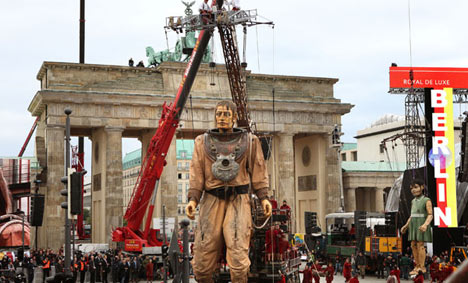Last year, Barack Obama wasn’t allowed to speak at the Brandenburg Gate, it’s so sacred a national landmark. On Saturday, a French puppet giantess was permitted to squat at the foot of it and take a wee.
God bless Berlin.
The impromptu toilet break just before the huge marionette walked through the gate was the most bizarre moment in a surrealistic day of celebration worthy of Germany’s irreverent capital.
Tens of thousands of people turned out for the climactic moment of the performance by French street theatre group Royal de Luxe in honour of the 19th anniversary of German reunification. Two giants, representing East and West Berlin, were “reunited” at the Brandenburg Gate after walking around the city for two days.
Click here for a photo gallery of the giants in Berlin.
Among the audience were Markus Eglin and his wife Gitta Zabel-Eglin, who met in early 1990, just months after the Berlin Wall fell. Appropriately, he came from the West and she from the East.
“This is like part of our life,” said Eglin, clearly moved by the moment at which the giants hugged and touched foreheads in a stunningly lifelike gesture of affection. “My wife and I are a real East-meets-West life story, so I found this afternoon very emotional. It was just fantastic.”
Despite the mammoth expectations whipped up by the spectacle’s organisers, the 15 metre-tall “big giant” and five-metre “little giantess” could not have failed to impress the most recalcitrant cynic.
They were a technical marvel, with their limb movements powered by the scurrying activities of the “Lilliputians,” the human crew dressed in 17th century French livery pulling and swinging from ropes to hoist the giant’s arms and legs in a convincing gait.
Click here to see the routes the giants will take from October 2 – 4.
In the allegorical story, the long-lost uncle and niece had been separated by the construction of a wall, which was subsequently destroyed by an earthquake, setting them on a quest around Berlin to find each other.
“It is a wonderful story for Berlin,” said Angela Hobeck from the western Berlin district of Steglitz, who watched the big giant walk down the Straße des 17 Juni boulevard with her twin sister Martina. “It is a real story of real people who were divided – and now look around you. I remember the day the wall fell and everybody was so excited and so happy. Today reminds them again of what that was like.”
However, the big giant’s initial effect on the crowd on Saturday morning, when he emerged from the water at the river harbour next to Berlin’s central train station, was hardly unifying.
The chartered boat for VIPs and the media dropped anchor broadside in the middle of the harbour, blocking the view for much of the crowd on the bank and prompting a barrage of angry shouting.
“I hope you’re having fun,” one woman yelled. “Because my son can’t see!”
But the Very Important Boat was unmoved and the Lilliputians on the bank were forced to relocate.
Fortunately, all was forgotten when the giant rose in his antique diver’s suit out of the water and up onto the bridge. Dense crowds followed him as he strode past the train station, over a bridge and past the Chancellery and Reichstag.
By the afternoon, Berlin was so unified that the police were forced to shut down the area around the Brandenburg Gate to stop the crowds pressing in too tightly.
“It gives you goosebumps,” said Arie Leeflang, a Dutch tourist who was holidaying in Berlin with his wife Janneke, and friends Hans and Ria van Yren.
The van Yrens had travelled down Berlin’s Spree River by boat in the mid 1980s.
“It was scary back then,” Mr van Yren said. “We were photographed all the way through. They even put cameras under the boat to make sure nobody was escaping. You wouldn’t believe that was the same wonderful city we see here today.”



 Please whitelist us to continue reading.
Please whitelist us to continue reading.
Member comments